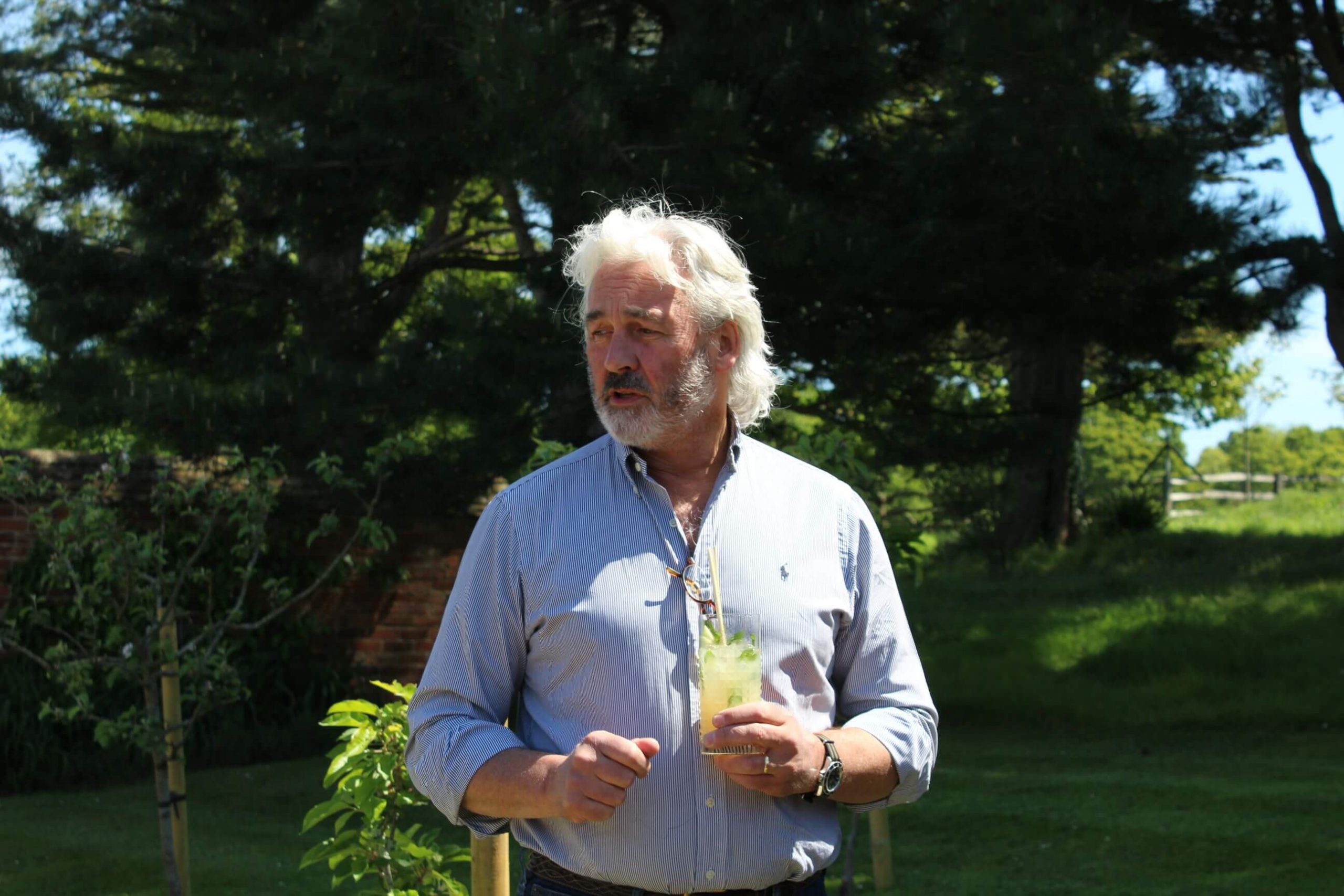Since starting his career as a waiter at Claridge’s Hotel, Robin Hutson has become one of the industry’s most successful hoteliers. His Pig Hotel family is widely regarded as one of the most innovative hotel brands, offering a laidback luxury style that informs every element of their operations.
Hutson recently hosted a special event with the Scholarship’s ‘Team Gold’, sharing insights into his career and what makes the Pig brand the success it has become.
We spoke to him to get his thoughts on the role of service in hospitality.
How did your hospitality journey begin?
If I’m honest, I was a bit of a dismal performer at Grammar School. I spent too much time chasing girls and not enough time studying so I ended up dropping out of school at 16.
My mother was pulling her hair out and didn’t know what to do with me so she suggested I consider exploring being a chef as I enjoyed mucking around in the kitchen. We didn’t have any connection to the sector but she thought it would be good for me to check it out.
As a result, after two years at Technical College, I ended up landing a place as a management trainee with the Savoy Company. My first job was as a waiter at Claridge’s. I say ‘waiter’ loosely as I spent much of my time holding big trays and dropping them regularly.
How did you find being a waiter?
I loved the glamour of being at Claridge’s. It was hard work, there were split shifts, and I worked six days a week. It was relentless but it was an amazing experience so early on in my career and it was a real baptism of fire from a work perspective.
I was just a kid from South East London and, within a few months, I was serving at a state banquet with 12 commonwealth heads of state – including the Queen.
I was wide-eyed about the whole thing. At the time, the actual art of good service and restaurant management struck a chord with me. Head waiters and managers had a range of skills that we can only be enviable of. They probably had a 100 different things they would do at a table-side.
Did you always have aspirations to do what you’re doing now?
I didn’t really have a game-plan to be honest – I was just trying to get through life. It was strange because they start training you and you didn’t really know how important this stuff was until later on.
At the time I was living in a bedsit in Tufnell Park and I was literally running out of money every week.
I do remember one point when, as part of my course, I ended up doing a bar module at a place called Stone’s Chop House.
We spent the first two weeks learning about ice, then another two weeks about glasses. It felt like such a long time until we got to touch any liquid. The course taught me so much. How can you create a cocktail, if you don’t understand the ingredients? It is vital to learn the basics and cut your cloth accordingly.
I enjoyed this learning though. When I was at school, I didn’t get three O-Levels (as they were back then) because I wasn’t clever. If I’m honest, I was just lazy and disinterested. Work was completely different for me; I enjoyed it and picked it up quickly.
What kept you going?
By the age of 23 I was reception manager at the Berkeley. It was a huge job where I was responsible for all reservations. Looking back, I had Dustin Hoffman on speed dial on one hand, and Diana Ross on the other. It was completely seductive.
I worked hard and got the breaks I needed early. Then, by the age of 27, I was offered the general manager post at Chewton Glen. I got very lucky there and while looking back I was far too young in many respects but I learned quickly to shut up and learn. I had to.
I can honestly say it was a brutal 10 years to get to that point and more hours than most people would do in 20 years. If I have one skill, I would have to say that I am tenacious. If I want to achieve something, I will make every effort to get there.
It was at 36 that I asked myself ‘Am I going to work for somebody else forever, or am I going to do my own thing?’. That’s when the Hotel Du Vin story began.
What did you do to get started?
Well, I didn’t have enough cash to finance it myself so I had to go and raise money. One thing I’ve learned about raising investment is that you have to kiss a lot of frogs before actually banking investment cash. I have been fortunate to meet some great people and we have been able to build a couple of interesting businesses.
What has been your most challenging career moment?
There are ups and downs every week in this job but I do remember a particular low. In the first month of working as reception manager at the Berkeley at 23, I was conned by a fraudster. A guest ordered all sorts of things and I was in charge of billing. I could have been hung out to dry by my employer but they were so supportive. It was such a valuable lesson to learn at a young age.
I recall one of my personal mentors, Patrick Smythe – who was assistant general manager at the Berkeley – saying “be careful of the ones who come up for air too much”. These are such wise words from a real legend of the industry. He pointed out that in the context of this particular guest, he became very friendly with staff very quickly, he was trying to lull everyone in the hotel into thinking he was a good guy – over compensation because he knew he had no funds to cover his stay.
The whole affair taught me a lot. I am far better at reading people now.
What has been a real career highlight for you?
One early break came for me while working as a barman at Stone’s Chop House aged 19. One of the wine waiters left and I threw my hat into the ring. Amazingly I got the job, despite hardly knowing one end of a wine bottle from the other. That was a great break and started my life-long love and interest of wine.
Given the nature of our industry, working hours can be irregular. What is the key to have a happy career and life outside of work?
Working in the hospitality industry can be challenging and there are examples of casualties along the way. Relationships in any walk of life can fail under the pressure. It’s difficult but it’s no different to any other profession or sector. A lot depends on your employer.
As employers, we have to be accommodating to our staff as they are integral to our success. In most of our kitchens, people work four-day weeks, which gives them time and space for fulfilling personal lives. For us, this has worked very well.
Being prepared is key and you need the staff behind you in order to deliver. For example, one of the key areas of any concern is when staff don’t know their rota in advance. We understand so do what we can to arrange these in advance. It’s a little thing, but examples such as this have a simple fix and we work hard to get this right.
Career development
What should young managers do to help them develop?
As an employer, we are very committed to the training and development of young people. That said, we are only part of the equation. We can provide the right environment in which to be taught and trained but we can only do so much. Something has to come from within the individual.
They have to be prepared to forage a little. An example, there is always today’s discarded newspaper lying around and our young people should be reading the food, wine, travel sections of these religiously every day. It will inform them greatly and tell them where the current moods and trends are.
Also, most restaurants in the UK have special lunch offers which can be relatively inexpensive. Experience it and keep your eyes open. Be curious. Every time you go to the pub and wine bar, don’t just knock back the wine, try to absorb what’s in the bottle and understand it.
What do you look for in service staff?
That really depends where you are. Sometimes you have to work with raw material but we love when people come to us having had a Saturday job while at school or college. It’s a tick for us as it immediately shows that this individual has an interest in working. Another key component for me is that staff have an optimistic disposition as happiness is infectious.
What are the main challenges service staff face?
Culturally, we still have this stigma of service being something you pass through and don’t make a career of. There is still that external force that says it’s not a proper job, which does the industry a real disservice.
We have an ever growing populous who understand food and wine, which in turn means they cannot be fooled, and there is an ever more demanding clientele that won’t accept substandard service.
How would you advise a young front of house manager who is looking to be the next Robin Hutson?
Work hard and be inquisitive about the industry and your role. Find that inner passion, whatever that may be and that will carry you through.
I would also say you have to think like an entrepreneur. What is the current gap in the industry? Is it doing something better? Different? Cheaper? My area of speciality is provincial hotels and I now know the theatre of operations pretty well.
Service
What role does service play for you in your business?
Service is everything and I mean that in the broadest of terms. I’m not necessarily talking about the ‘technical table-side’ element but it’s an intelligent interaction between guests and staff.
Every person is in a restaurant for a different reason and you have to recognise the individual. We talk a lot about the extra 5%. Guests expect 100% for a transaction and the extra 5% is about delivering that little spark of magic that’s not in the normal realm of service. Find that extra 5%.
How have you seen service change since you first started?
Most guests don’t expect service to be servile. Generally, they are looking for an equal interaction. In days gone by we were discouraged from interacting at a certain level that, now, most operators would encourage it.
It comes down to the popularisation of the dining experience. It is available to a much broader sector of society and service style needs to change to reflect that. Post-war, people going out to restaurants were of a monied and class distinction. Now it’s a much broader church.
Why is the Gold Service Scholarship important and what impact has it had?
We are very keen on developing and training and the Gold Service Scholarship is all about developing excellence. In today’s more casual environment we find ourselves in, it is important to have standard bearers for excellence.
It’s a great thing for the sector. The more activity that is about rewarding excellence, the better it is for the industry as a whole.



